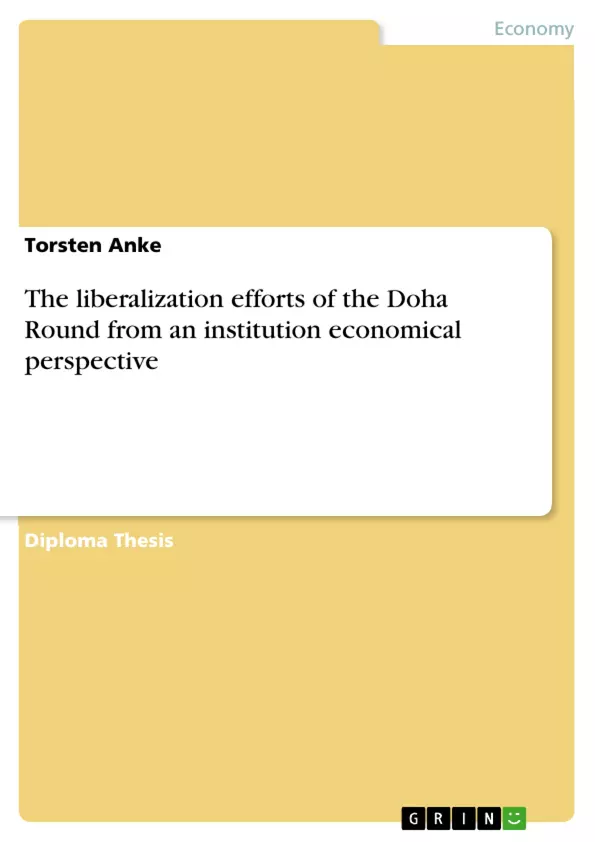In the prevailing paper, I will argue that the current institutional structure of the multilateral trade negotiations is the decisive factor that limits considerable progress in the liberalization of international agricultural markets. WTO members face a growing institutional complexity which does not allow for substantial liberalization steps. Rather, countries need to find alternative ways to improve their individual trade balance. My examinations will base on the insights of the New Institutional Theory (NIE), which puts its scientific interest on institutions. Since institutions serve as a direct interface of societal processes, including economical as well as political characteristics, its application provides an appropriate attempt to approach multilateral trade negotiations – a subject that indeed touches both areas.
Inhaltsverzeichnis (Table of Contents)
- 1 Introduction
- 2 The World Trade Organization
- 2.1 General Guidelines of International Trade
- 2.2 Multilateral Trade Negotiations
- 2.3 The Way to Doha
- 2.4 The Doha Development Agenda
- 2.4.1 The Special Role of Agriculture
- 2.4.2 The Commitments of the Doha Development Agenda in Agriculture
- 2.4.3 Progress of the Doha Development Agenda so far
- 3 New Institutional Economics Theory
- 3.1 Institutions Matter
- 3.1.1 Theoretical Assumptions
- 3.1.2 Major Research Approaches
- 3.1.2.1 Transaction Cost Theory
- 3.1.2.2 Property Rights Theory
- 3.1.3 Why Having Chosen the NIE?
- 3.2 Libecap's Analytical Framework
- 3.1 Institutions Matter
- 4 Institutional Analysis of Agricultural Negotiations
- 4.1 What Can Be Gained from Liberalizing Agriculture?
- 4.1.1 Market Access
- 4.1.1.1 Tariffs
- 4.1.1.2 Tariff Rate Quotas
- 4.1.1.3 Potential Market Access Gains
- 4.1.2 Domestic Support
- 4.1.2.1 Green Box and Blue Box
- 4.1.2.2 Amber Box Payments and the “De-Minimis-Clause”
- 4.1.3 Export Subsidies
- 4.1.3.1 Direct Export Subsidies
- 4.1.3.2 Export Credits
- 4.1.3.3 State Trading and Food Aid
- 4.1.4 Total Size of Potential Gains
- 4.1.1 Market Access
- 4.2 How Many Different Interests Are Concerned?
- 4.2.1 Defining Interest Groups
- 4.2.2 Civil Society and the WTO
- 4.2.3 Traditional Interests in the Agricultural Market
- 4.2.4 Modern Interests in the Agricultural Market
- 4.2.4.1 Consumer Groups
- 4.2.4.2 Environmental Groups
- 4.3 How Heterogeneous Are the Contracting Parties?
- 4.3.1 The WTO Decision-Making Process
- 4.3.2 Reasons and Categories for WTO Coalitions
- 4.3.3 Coalitions during the Uruguay Round
- 4.3.4 Coalitions in the Doha Round
- 4.3.4.1 The Bargaining Position of the European Union
- 4.3.4.2 The Bargaining Position of the United States
- 4.3.4.3 The Bargaining Position of the G-20
- 4.4 Evaluation of the Institutional Analysis
- 4.4.1 Results of the Institutional Analysis
- 4.4.2 Transaction Cost Theoretical Examination
- 4.1 What Can Be Gained from Liberalizing Agriculture?
- 5 Conclusions and Implications
Zielsetzung und Themenschwerpunkte (Objectives and Key Themes)
This diploma thesis examines the liberalization efforts of the Doha Round from an institution economic perspective. It aims to provide a comprehensive analysis of the institutional challenges and opportunities for agricultural trade liberalization within the World Trade Organization (WTO).
- Institutional analysis of agricultural negotiations
- Impact of interest groups and coalitions on the WTO decision-making process
- Transaction cost theory and its implications for agricultural liberalization
- The role of agricultural protection and its impact on global trade
- Potential benefits and challenges of agricultural trade liberalization
Zusammenfassung der Kapitel (Chapter Summaries)
- Chapter 1: Introduction - This chapter sets the scene by providing background information on the Doha Development Agenda and its significance for agricultural trade liberalization. It outlines the main objectives and research questions of the thesis.
- Chapter 2: The World Trade Organization - This chapter explores the general guidelines of international trade, the history of multilateral trade negotiations, and the evolution leading to the Doha Development Agenda. It highlights the specific role of agriculture in the Doha Round and the commitments made by participating countries.
- Chapter 3: New Institutional Economics Theory - This chapter delves into the theoretical framework of New Institutional Economics (NIE) and its relevance for analyzing the agricultural negotiations within the WTO. It introduces the key concepts of transaction costs, property rights, and how they shape institutional arrangements.
- Chapter 4: Institutional Analysis of Agricultural Negotiations - This chapter analyzes the institutional challenges and opportunities for agricultural liberalization. It examines the potential gains from liberalizing agricultural trade, identifies various interest groups involved in the negotiations, and explores the dynamics of coalition building within the WTO.
Schlüsselwörter (Keywords)
This diploma thesis revolves around key concepts such as agricultural trade liberalization, the Doha Development Agenda, the World Trade Organization, institutional economics, transaction costs, property rights, interest groups, coalitions, and the bargaining process.
Frequently Asked Questions
What is the main argument regarding the Doha Round negotiations?
The thesis argues that the current institutional structure of the WTO is the decisive factor limiting progress in liberalizing international agricultural markets.
Which theoretical framework is used for this analysis?
The analysis is based on New Institutional Economics (NIE), specifically Transaction Cost Theory and Property Rights Theory.
What are the specific areas of agricultural liberalization discussed?
The thesis examines market access (tariffs/quotas), domestic support (Green/Blue/Amber boxes), and export subsidies.
Which major coalitions are analyzed in the Doha Round?
The bargaining positions of the European Union, the United States, and the G-20 are explored in detail.
Why is agricultural trade liberalization so complex?
Complexity arises from heterogeneous interests among contracting parties and the influence of modern interest groups like environmental and consumer organizations.
- Arbeit zitieren
- Torsten Anke (Autor:in), 2006, The liberalization efforts of the Doha Round from an institution economical perspective, München, GRIN Verlag, https://www.grin.com/document/64684



